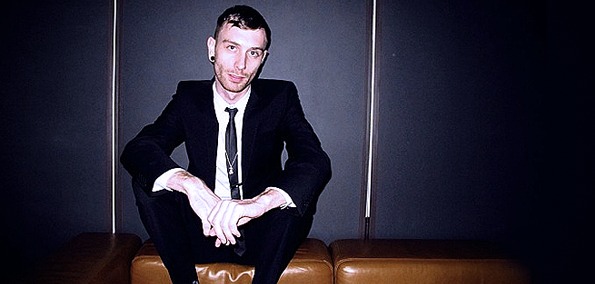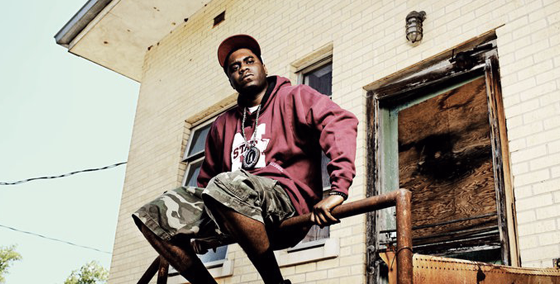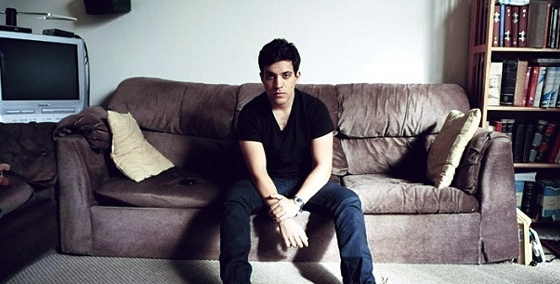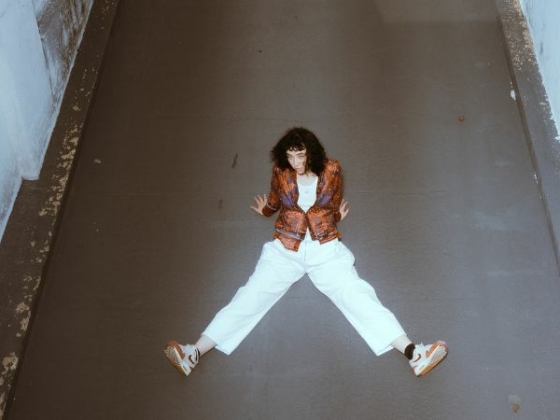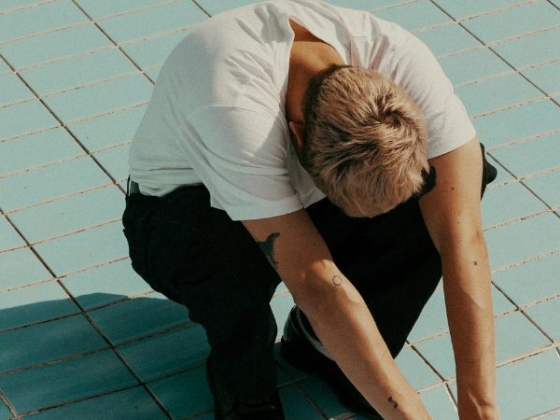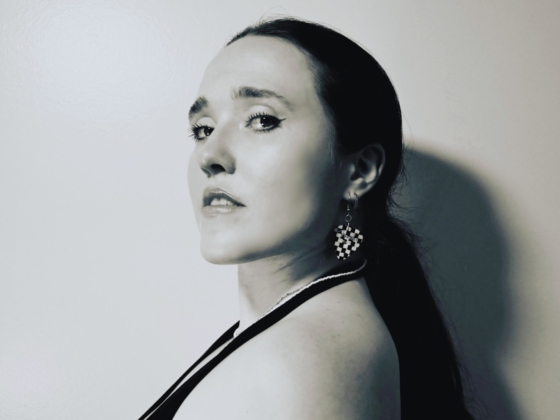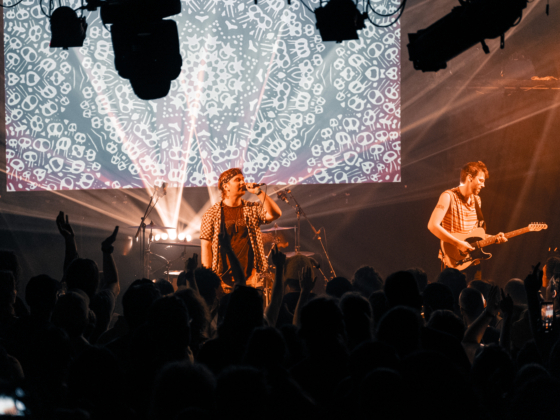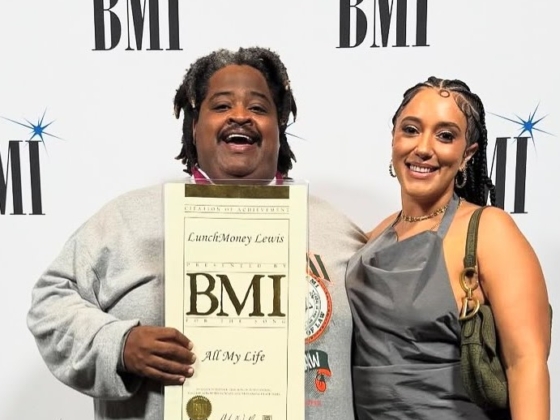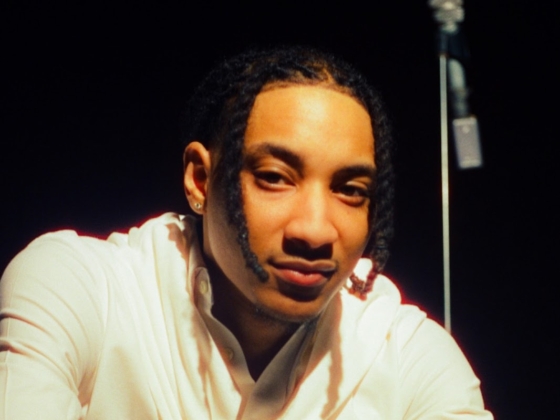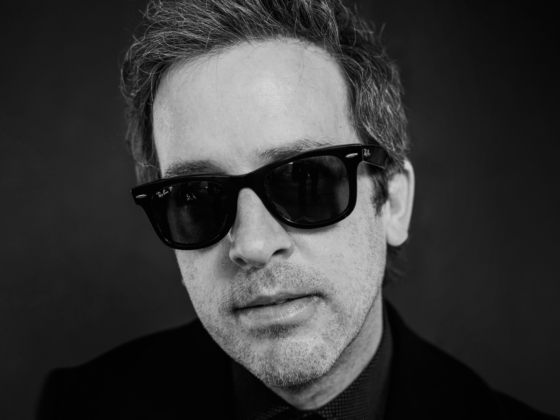A week ago today, I did what I do the first Monday of every month and adorned myself in goth gear for Boston's monthly CVLT party at Middlesex Lounge. Their booking is on point for bringing in dance music innovators and keeping it weird, and lately, they have a shameless crush on Trouble & Bass, Brooklyn's mischievous bass crew, with sets from Deathface, Star Eyes, and now, The Captain (a.k.a. Patrick Rood) being brought to our musically humble — but on the cusp of something even more amazing, I think — city.
The Captain is more than just a DJ or producer, he's also had his hands in just about everything Trouble & Bass has touched, from their merch to their videos to their visual aesthetic to the music that they curate. Read on for more about running a record label, how his taste for hardcore/punk/DIY has influenced T&B's New York parties, and some super-varied music recommendations. New Yorkers, you can catch The Captain at Trouble & Bass vs. Body High in Brooklyn at Glasslands Gallery this Friday (May 18)! See ya there.
EARMILK: So I guess first if you just want to explain — because you do a lot of different things, which is why I think this will be an awesome interview — do you want to go into detail on what you work on?
Patrick Rood: Everything. I run Trouble & Bass, and within that is records, releases, events, merch, the DJ crew, and aside from that I started a second company which is all Trouble & Bass Bookings, which is us representing our T&B artists. Doing bookings for them. I direct and produce some videos for Trouble & Bass, help design covers, help make shirts, everything that comes out of Trouble & Bass has my hand in it. In it, around it, up it.
EM: How did you end up getting involved with that?
PR: I met Drop the Lime when I first moved to New York, I actually booked him for a party I was doing. We slowly became friends, he went to Berlin for like 6 months, then he came back and then started Trouble & Bass. And then like a year later I joined forces and helped do events and became part of the DJ crew. And after a little while of that, I was helping with the record label.
EM: Where else have you lived, other than New York?
PR: I grew up in Massachusetts, in Westfield, and then I went to college in Savannah, Georgia, at the Savannah College of Art and Design for four years. Then from there, I moved to Brooklyn. And that's it. Three places.
EM: As far as American bass music, what do you think are the cities that are innovating?
PR: Um, for America? [laughs] It's hard. Well, I go to San Francisco, it's a really cool scene there. They have a lot of really big underground shows where they've have, you know, bigger names, that aren't huge, but there'll be a thousand people there. There's a cool scene in Miami, it depends on when you go there. Obviously during the Winter Music Conference it's really good. Austin's pretty cool, I just went there recently, it was really fun. L.A. has a lot of good stuff going on too. One artist Samo Sound Boy has his own label (Body High), they do events out there too. They're like weird, kind of West Coast-based music. Ghetto underground stuff. It's cool.
Samo Sound Boy – "Shuffle Code" [produced by Patrick Rood]
[vimeo]https://vimeo.com/27329917[/vimeo]
EM: What are your main musical interests and influences?
PR: My main ones? I grew up with some hardcore and punk sort of, I've always listened to metal and black metal and other stuff like that. I can't listen to dance music all the time — it gets really boring. I want to know what I want to put out, it's really helpful, but also a lot of rap, a lot of hardcore and metal, and like — weird dance music that isn't always playable.
EM: What's your weirdest dance music?
PR: Weirdest dance music? Traci Lords, 1,000 Fires. [laughs]
EM: What are you thinking about playing tonight?
PR: I made a mix for CVLT, it's kind of darker techno and house, a little bit of like, half time drummy stuff. Hopefully I fit into the realm of the CVLT experience.
EM: It's usually pretty diverse, sounds like you have all of the aspects of that.
PR: When you travel a lot, and you go to specific scenes, you have to kind of be ready to adapt or know what people want to listen to, without, you know, you've still got to do your thing, I've still got to do my thing, but you know, in the right place.
EM: What kind of equipment do you use for DJing?
PR: I use Serato, like every other person in the world. I used to use turntables but I'm trying to use CDJs and Serato. It's more stable.
EM: How was the transition from turntables to Serato?
PR: It was all right. It was weird, I did it a long time ago, when Serato first came out I got it. It was strange having to read on a computer screen, compared to visually looking at your records. Because you see a record and you know what it is; it's like seeing a shirt in a drawer. You know it, like, oh, that's orange, that's this one. You don't have to read anything, you just know it by color. So going from a color-oriented musical choice to reading a computer screen.
EM: Have you ever done a hybrid of the two, or I mean, incorporated a combination of analog and digital?
PR: That could be pretty cool. I've heard of it being done, with live performances. Like I saw Addison Groove play in Brooklyn, and he was doing something like that, he had a mix of Abelton tracks but with actual gear, like an 808, it was pretty cool, cool to see people experiment at least a little bit. It just sucks when you see — it can go wrong really easily. Like gear malfunctions, or they get frustrated, that sucks.
EM: What are you currently listening to?
PR: Aside from our own stuff… I'm always listening to Trouble & Bass stuff, because I'm getting new stuff mastered, and have to listen to it all the time. There's a new Deathface EP that's coming in July, I listen to it a lot. I did masters of that, like, today. I listen to a lot of R&B, I listen to The Weeknd a lot. I listen to metal, I listen to Creation is Crucifixion, I listen to The-Dream a lot, you know, I like to mix it up.
Deathface – "Bloodrave" [directed and produced by Patrick Rood]
[vimeo]https://vimeo.com/21120852[/vimeo]
EM: What do you think of the general progress the electronic music scene's making right now?
PR: I mean it's going like a hundred different places at the same time. So it's kind of strange — little offshoots of music will be really popular, like the footwork scene from Chicago is really popular right now, and Night Slugs' music from the UK is really popular, so it's really fun, it's really cool to be a part of, it's really cool to listen and watch it grow. But you know — there's good parts and bad parts. There's bad music being made all the time. Things that become popular get oversaturated and shitty, like moombahton, or dubstep, or electro house. But you know, they'll slow down, and they'll come back. It's just the way musical cycling goes.
EM: Where do you think the most innovation is happening right now? At least as far as your personal interests and tastes.
PR: You mean musically? As in like, a region, or actual music? (EM: I guess like, either regional scenes, or genres, or wherever there are like, hotbeds. Like I interviewed Salva a month or so ago, and I think he mentioned New York City and Trouble & Bass.) I like Salva's label a lot, you know, I saw him play in Austin, I saw him in Miami, really good sets, I like him a lot. His label is dope, he runs a label called Frite Nite, which one of our artists, Star Eyes, is going to put a record out on as Dark Ages, which is with her and 5kinandBone5 — that guy's doing cool stuff too. You know 5kinandBone5? He's got really cool music coming out. There's a weird general contraption of like, bass, mixed with a lot of stuff borrowed from hip hop right now, which I think is what everyone is trying to make. I'm even making it with a friend of mine, it's just the most attractive sound to a lot of producers. Which influences what they all do. So all these people who are popular and make music are slowly integrating hip hop styles with bass music. But you know, a lot of people who are like, making half acid, and making house, and going from bass music to strictly house music or strictly acid music. It's interesting to see what people from one scene grow out of or get kind of tired of — "I'm tired of doing this, I'm going to do this."
EM: Since you've done a lot of work on videos and the visual side of things, how do you think that art and music sort of play together, what's the importance of the visual aspect to a musical scene?
PR: From a label standpoint, you need visual things to get people's attention so they'll pay attention to what you're doing. Like a video so people can sit there and watch it, or art that they can put anywhere or print out, or I sell posters, something. It's almost a necessity for a label to have something to go along with a release. If you don't do something extra, who cares, you know? Because no one puts records out that often anymore, it's all digital, so if you're going to see them do a digital record, with no video, or no even like, fun, minute-long teaser, people want something to grab their attention.
EM: What are the some of the underlying thoughts behind the Trouble & Bass aesthetic? Because you have a pretty awesome aesthetic.
PR: To me it's all like retro-future-horror. You know, like, stuff that we all grew up really being into — like horror movies, or half of us are old junglists, half of us are old punks, so all those things kind of come together and it's a more adult take on all these things. Like we're not kids, so we're not going to put out, like, a bloody skull, or a bloody knife, but we will take that idea and turn it into something that we would want to wear or want to see or want to be a part of to express ourselves.
EM: As far as what sort of scenes you participated in when you were younger vs. now, sort of following that trajectory, what's been the progression for you? What sort of things have you ended up dropping over time and what's remained true for you?
PR: I used to go to hardcore shows and that kind of slowly turned into going to "parties." I lived in Savannah so I'd go to live shows all the time, because I DJed at a live venue, so every day of the week I'd just go to live shows, but once I moved to New York, that kind of stopped, where I didn't go to as many live shows because there were just too many live shows, and it's expensive, and so I'd see bands once in a while, when I grew up it was like all I would do, so you know, my progression of ten years was like live show, live show, live show, party, party, party. But I guess a lot of people, just growing up, they do the same thing.
[soundcloud url="https://api.soundcloud.com/tracks/11424444" params="show_comments=true&auto_play=false&color=000000" width="100%" height="81" iframe="false" /]

